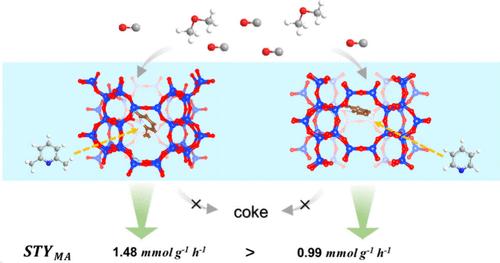丝光沸石催化二甲醚羰基化的分子调节剂:消除失活位点,调节微环境,增强活性
IF 13.1
1区 化学
Q1 CHEMISTRY, PHYSICAL
引用次数: 0
摘要
沸石通常用作多相催化反应的催化剂。然而,在某些反应中,沸石催化剂经常发生严重的失活。沸石失活的调控是多相催化剂设计中的一个重大挑战。在这项研究中,我们提出了有机分子调节剂,如2,6-lutidine,优先吸附在丝光沸石(MOR)沸石的T4-O24位点,从而调节反应的微环境并管理催化剂失活。MOR中的h位点可以作为连接有机分子调节剂的凹槽来控制反应。与一般的吡啶分子相比,这种分子调节剂对反应物和中间体的传质影响较小,同时具有强大的CO活化能力。该分子调节剂的策略产生了显著的乙酸甲酯产率高达1.48 mmol gcat-1 h-1,同时表现出值得称赞的稳定性。这种分子调节剂的使用为延长沸石催化剂的使用寿命和有效性提供了一条有希望的途径,从而为更强大和高效的工业化学过程铺平了道路。本文章由计算机程序翻译,如有差异,请以英文原文为准。

Molecular Regulator in Mordenite-Catalyzed DME Carbonylation: Eliminating Deactivation Sites, Modulating Microenvironments, and Enhancing Activity
Zeolites are commonly used as catalysts for heterogeneous catalytic reactions. However, severe deactivation of zeolite catalysts often occurs during certain reactions. The regulation of zeolite deactivation is a significant challenge in heterogeneous catalyst design. In this study, we present organic molecular regulators, like 2,6-lutidine, to preferentially adsorb at the T4-O24 site of the mordenite (MOR) zeolite, thereby modulating the microenvironment of the reaction and managing catalyst deactivation. The H-site in the MOR can be used as a pothook to link organic molecule regulators to control the reaction. In comparison to general pyridine molecules, this molecular regulator has less effect on the mass transfer of the reactants and intermediate species, simultaneously contributing to a robust CO activation capability. The strategy of this molecular regulator has yielded a remarkable methyl acetate production rate of up to 1.48 mmol gcat–1 h–1 while exhibiting commendable stability. The use of such molecular regulators presents a promising avenue for extending the operational lifespan and effectiveness of zeolite catalysts, thus paving the way for more robust and efficient industrial chemical processes.
求助全文
通过发布文献求助,成功后即可免费获取论文全文。
去求助
来源期刊

ACS Catalysis
CHEMISTRY, PHYSICAL-
CiteScore
20.80
自引率
6.20%
发文量
1253
审稿时长
1.5 months
期刊介绍:
ACS Catalysis is an esteemed journal that publishes original research in the fields of heterogeneous catalysis, molecular catalysis, and biocatalysis. It offers broad coverage across diverse areas such as life sciences, organometallics and synthesis, photochemistry and electrochemistry, drug discovery and synthesis, materials science, environmental protection, polymer discovery and synthesis, and energy and fuels.
The scope of the journal is to showcase innovative work in various aspects of catalysis. This includes new reactions and novel synthetic approaches utilizing known catalysts, the discovery or modification of new catalysts, elucidation of catalytic mechanisms through cutting-edge investigations, practical enhancements of existing processes, as well as conceptual advances in the field. Contributions to ACS Catalysis can encompass both experimental and theoretical research focused on catalytic molecules, macromolecules, and materials that exhibit catalytic turnover.
 求助内容:
求助内容: 应助结果提醒方式:
应助结果提醒方式:


